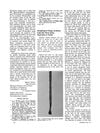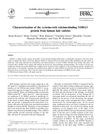 12 citations,
July 2014 in “Journal of Investigative Dermatology”
12 citations,
July 2014 in “Journal of Investigative Dermatology” Chemotherapy causes complex changes in hair follicle cells that can lead to hair loss.

Eating more protein during weight loss can prevent hair loss caused by not having enough protein.
 November 2022 in “Research Square (Research Square)”
November 2022 in “Research Square (Research Square)” Keratin-associated proteins have ancient origins and were used for different purposes before being adapted for hair in mammals.
May 2019 in “Journal of Acupuncture Research” Sebalgukhwa-san (SGS) can help treat hair loss without liver toxicity.
 181 citations,
January 2009 in “Nature Genetics”
181 citations,
January 2009 in “Nature Genetics” Certain mutations in a hair growth-related gene cause a type of genetic hair loss.
 14 citations,
October 2020 in “Scientific reports”
14 citations,
October 2020 in “Scientific reports” Hair greying is linked to reduced ATM protein in hair cells, which protects against stress and damage.
 9 citations,
July 2011 in “Scientific Reports”
9 citations,
July 2011 in “Scientific Reports” Changes in the HR gene have influenced hair growth and may lead to hair loss conditions in humans.
 March 2023 in “Biomedicine & Pharmacotherapy”
March 2023 in “Biomedicine & Pharmacotherapy” GPR40 agonists help hair growth through the protein ANGPTL4.
 11 citations,
August 2013 in “International Journal of Cosmetic Science”
11 citations,
August 2013 in “International Journal of Cosmetic Science” The study suggests that a new protease inhibitor can make hair harder to pull out, potentially reducing hair loss.
 70 citations,
June 2010 in “Clinics in Dermatology”
70 citations,
June 2010 in “Clinics in Dermatology” Certain groups may need vitamin supplements to improve hair health and prevent other health problems.
17 citations,
May 2012 in “Journal of biological chemistry/The Journal of biological chemistry” Hairless protein affects hair follicle structure by regulating the Dlx3 gene.
 71 citations,
June 2001 in “American Journal of Pathology”
71 citations,
June 2001 in “American Journal of Pathology” The p53 protein helps control hair follicle shrinking by promoting cell death in mice.
 74 citations,
September 2006 in “Cell Cycle”
74 citations,
September 2006 in “Cell Cycle” The HR protein's role as a repressor is essential for controlling hair growth.
 17 citations,
January 2020 in “Skin appendage disorders”
17 citations,
January 2020 in “Skin appendage disorders” Certain diets may help with hair growth in people with different types of hair loss.
 11 citations,
April 2013 in “Journal of Proteomics”
11 citations,
April 2013 in “Journal of Proteomics” Found different proteins in balding and non-balding cells, giving insight into hair loss causes.
 21 citations,
January 2018 in “The Korean Journal of Physiology and Pharmacology”
21 citations,
January 2018 in “The Korean Journal of Physiology and Pharmacology” Modified stem cells from umbilical cord blood can make hair grow faster.
1 citations,
June 2021 in “Journal of pharmacopuncture” CBD may help restore hair growth-related protein levels in alopecia caused by hormones or other factors.
 September 2023 in “Medicine”
September 2023 in “Medicine” The research suggests immune system changes and specific gene expression may contribute to male hair loss, proposing potential new treatments.
66 citations,
February 2007 in “The journal of investigative dermatology/Journal of investigative dermatology” Adenosine may promote hair growth by increasing FGF-7 levels in dermal papilla cells.
 November 2024 in “Journal of Scientific Agriculture”
November 2024 in “Journal of Scientific Agriculture” Silk proteins are great for cosmetics because they protect and improve skin and hair while being eco-friendly.
 11 citations,
January 1997 in “Skin Pharmacology and Physiology”
11 citations,
January 1997 in “Skin Pharmacology and Physiology” A certain inhibitor can slow down the decrease in DNA creation in mouse hair follicles, which might help with hair growth.
 18 citations,
April 2013 in “Inflammatory Bowel Diseases”
18 citations,
April 2013 in “Inflammatory Bowel Diseases” People with Inflammatory Bowel Disease often lose hair due to stress, medication side effects, or lack of nutrients, and treatment depends on the specific cause.
 13 citations,
August 2020 in “Journal of Laparoendoscopic & Advanced Surgical Techniques”
13 citations,
August 2020 in “Journal of Laparoendoscopic & Advanced Surgical Techniques” Biotin supplements are generally ineffective in preventing hair loss after sleeve gastrectomy.
 5 citations,
October 1984 in “The BMJ”
5 citations,
October 1984 in “The BMJ” Up to 50% of scalp hair can be lost before it appears thin, and treatment is only needed for hair loss caused by diseases or deficiencies.
 April 2018 in “bioRxiv (Cold Spring Harbor Laboratory)”
April 2018 in “bioRxiv (Cold Spring Harbor Laboratory)” A gene variant causes patched hair loss in mice, similar to alopecia areata in humans.
 370 citations,
September 1999 in “The New England Journal of Medicine”
370 citations,
September 1999 in “The New England Journal of Medicine” Finasteride and minoxidil are effective for hair loss, but continued research is needed for better treatments.
 47 citations,
July 1967 in “Science”
47 citations,
July 1967 in “Science” Not eating enough protein can cause hair roots to shrink and lose color, and hair to become thinner.

Water and fatty acids affect hair's surface differently based on hair damage, and models can help understand hair-cosmetic interactions.
 January 2012 in “Elsevier eBooks”
January 2012 in “Elsevier eBooks” Hair loss can cause emotional and social issues, and various treatments, including medication, surgery, and psychological support, are needed.
 17 citations,
December 2002 in “Biochemical and biophysical research communications”
17 citations,
December 2002 in “Biochemical and biophysical research communications” Scientists found out how a specific protein in human hair cuticles behaves and is structured.


























